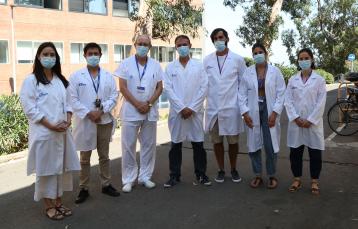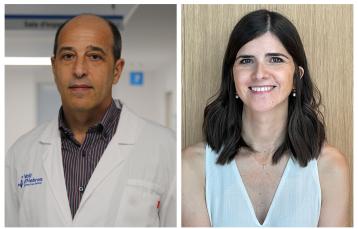Clinical Biochemistry
Description
Residents in clinical biochemistry have different objectives and specialised tasks according to which rotation phase they are in.
During their training period, resident doctors prepare to be on duty in the Accident and Emergency Department laboratories, where they calibrate, control and troubleshoot minor failures of analytical instruments. They also collect and extract samples from adult patients admitted to hospital, outpatients and paediatric patients.
During their first rotations they work with instrument warning signals and solutions, analysis and verification of calibrations, and the results of control and differentiation in different patients, outpatients, critical care patients, patients from paediatrics, and those who have had transplants, etc. Specialists subsequently learn about basic haematology, erythropathology, and the use of tumoural markers in the laboratory. Specialists undertake rotations while progressively increasing their level of specialisation and variety, from the areas of Quality, Lipids, Enzymes and Special Techniques, to Allergies, and Molecular Genetics and Hormones, among others.
Lastly, they must work in laboratory management and they have the option to work in the primary care laboratory.
The laboratory encourages residents to take part in research through collaboration during rotations and specific projects in the final phase of their fourth year.
We foster the writing of scientific articles, the design of clinical trials, data analysis, attendance at congresses in the specialisation and potential collaboration with the Vall d’Hebron Research Institute.
Accredited places: 2
Download the Unit training programme
Why should you specialise at Vall d’Hebron?
- Because we are the largest and most active clinical laboratory in the country. We process up to 6,500 requests daily.
- Because we innovate using robotic pre-analysis process chains, connections to multiple automated analysis equipment, and high performance computer systems to maintain a high level of automation.
- Because we work alongside other specialisations in the Clinical Laboratories, with whom we share projects, work spaces, and facilities.
- Because we are the largest tertiary hospital clinical laboratory in Catalonia, with complex diagnostics and monitoring of admissions and outpatients.
- Because we make it possible to take part in conferences, seminars and courses on subjects such as radiation protection, statistics and scientific documentation.
- Because we encourage professionals to participate in the accredited continuous professional development clinical sessions.
- Because we offer the chance to present oral papers on subjects of interest for the clinical laboratory, supervised by the staff doctors on the team, residents or external specialists.
- Because we make it possible to complete part of your training at a centre outside the Vall d’Hebron Clinical Laboratories for up to 6 months, on the laboratory or the resident’s own initiative. Professionals can choose from other laboratories or departments at Vall d'Hebron University Hospital and other national and international hospitals.












